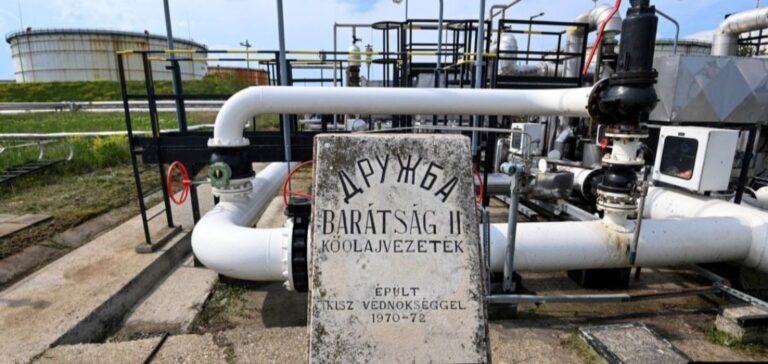Hungary and Slovakia find themselves in the midst of an energy conflict with Ukraine, which recently halted the transit of Russian Lukoil oil through its territory.
This interruption directly threatens the energy supply of both countries, which are heavily dependent on Russian oil for their refineries.
This dispute highlights the persistent energy vulnerabilities of certain members of the European Union, and the complexity of geopolitical relations in the region.
Hungary’s accusations
Hungarian Foreign Minister Peter Szijjarto strongly criticized the European Commission, accusing it of failing to act effectively to resolve the problem.
In his view, stopping transit through Ukraine is a clear violation of the EU-Ukraine Association Agreement.
Szijjarto goes further, insinuating that Brussels may be behind this crisis, with the aim of putting pressure on EU countries opposed to arms transfers to Ukraine.
Hungary, which relies heavily on Russian oil to fuel its economy, feels hostage to this situation.
Szijjarto denounced an “attempt at blackmail” orchestrated by the European Commission, and urged the latter to take immediate steps to restore oil flows.
Slovakia’s reaction
Slovakia’s Prime Minister, Robert Fico, has also reacted strongly, threatening to halt diesel deliveries to Ukraine if oil flows are not quickly restored.
Slovakia, like Hungary, is facing an oil shortage due to Ukrainian sanctions against Lukoil.
Fico has proposed a technical solution to the problem, although the details of this proposal have not been disclosed.
Slovakia’s dependence on Russian oil is such that any interruption in supply could have serious consequences for its economy.
Fico’s criticism of Kyiv’s sanctions reflects a growing frustration with a situation he considers detrimental to his country.
Ukraine’s response
Ukraine, through its Deputy Energy Minister Roman Andarak, has assured us that it is ready to resolve transit problems for unsanctioned companies.
He pointed out that oil transit for other Russian suppliers has not been interrupted, and that Ukraine remains a reliable energy transit partner for the EU.
Andarak stressed that Kyiv “guarantees uninterrupted transit” for all companies not subject to Western and Ukrainian sanctions.
This position is intended to show that Ukraine is still committed to meeting its energy transit obligations, despite the current tensions.
Role of the European Commission
The European Commission said it had begun gathering information to assess the situation and had contacted the Ukrainian authorities.
However, the lack of a rapid response prompted harsh criticism from Hungary and Slovakia, exacerbating internal tensions within the EU.
The Commission has indicated that it is putting detailed questions to Slovakia and Hungary to establish a full analysis of the situation.
The questions cover current oil transit volumes, legal entities shipping oil via Ukraine, existing contracts, and the possibilities and costs of alternative supply routes.
Suspension of European funds
In response to this crisis, Hungary suspended EU reimbursements for military aid to Ukraine, demanding the resumption of oil transit.
This suspension concerns funds from the European Peace Fund (EPF), underlining the use of financial levers to exert political pressure.
Peter Szijjarto has stated that until Ukraine resolves this situation, the 6.5 billion euros in reimbursements for arms transfers will remain on hold.
The Ukrainian Ministry of Foreign Affairs has not yet officially responded to this suspension, but has made it clear that the blocking of funds does not affect the overall flow of oil via the Druzhba pipeline.
This pipeline, nicknamed “Friendship”, continues to operate despite more than two years of conflict, although the EU has significantly reduced its dependence on Russian energy sources.
Persistent energy dependence
This conflict highlights the continuing dependence of some European countries on Russian oil, despite EU efforts to reduce this dependence since Russia’s invasion of Ukraine.
Hungary, Slovakia and the Czech Republic benefit from temporary exemptions from the EU oil embargo, but these exemptions reveal their vulnerability to transit interruptions.
The situation also demonstrates the challenges the EU faces in maintaining solidarity between its members while managing external energy pressures.
The EU’s ability to find a lasting solution to this conflict will be crucial to its long-term energy stability.
Viktor Orban visits Moscow
Hungarian Prime Minister Viktor Orban’s recent visit to Moscow to meet Vladimir Putin has heightened tensions within the EU.
The visit, made without prior consultation with other EU members, angered many European partners.
In response, the European Commission announced a reduction in representation at meetings in Hungary, limiting participation to senior officials until the end of the year.
The decision to boycott a meeting of foreign ministers scheduled to take place in Budapest in August demonstrates the escalation of intra-European tensions.
This complex situation highlights the current energy and diplomatic challenges in Central Europe.
Resolving this energy conflict is crucial to maintaining unity and energy security within the EU.
Ongoing negotiations, possible actions by the European Commission, and the responses of the parties involved will determine the outcome of this crisis, with significant implications for relations between member states and the region’s energy supply.





















